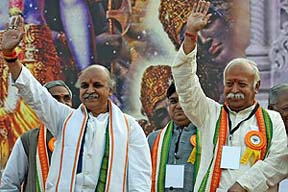 NAGPUR: Reaffirming its commitment to abrogation of Article 370 in Jammu and Kashmir, RSS today batted for the success of the “novel experiment” in the state, where BJP has formed a government for the first time with PDP, saying the rift between the two were only “teething problems”.
NAGPUR: Reaffirming its commitment to abrogation of Article 370 in Jammu and Kashmir, RSS today batted for the success of the “novel experiment” in the state, where BJP has formed a government for the first time with PDP, saying the rift between the two were only “teething problems”.
The BJP’s ideological mentor made it clear that notwithstanding the saffron party putting aside the contentious issue of Article 370 to forge an alliance with PDP, its own stand on it remained unchanged.
“RSS’s stand on Article 370 has not changed, we will never compromise on it. We want the situation to improve. If the situation does not improve, then we will decide,” RSS joint general secretary Dattatreya Hosabale told reporters at a briefing after the three-day brainstorming session of Akhil Bhartiya Pratinidhi Sabha, the apex decision-making body of RSS, got underway here this morning.
While insisting that its opposition to Article 370, which bestows special status on Jammu and Kashmir, will continue, the RSS leader said the Sangh fountainhead wanted the new experiment in the state to succeed.
“This is a novel experiment. In J&K, no nationalist party had ever reached this point. These are teething problems. We should allow time and opportunity for this experiment to succeed,” he said.
He, however, expressed concern over the occurrences in the state, including the release of separatist leader Masarat Alam by the Mufti Mohammed Sayeed government.
“The issue of J&K is not between two parties in an alliance…it is attached to national sentiment. Both BJP and the Prime Minister have voiced disapproval over what has happened in Jammu and Kashmir,” Hosabale said.
“The country is angry. We don’t think what is happening in Jammu and Kashmir is right, but we should not conclude that the government has failed,” he said. . The relations between BJP and PDP have been under strain since the day the coalition government under Mufti Mohammed Sayeed assumed office.
Soon after taking oath, Sayeed had credited elements in Pakistan, separatist Hurriyat Conference and militants for peaceful Assembly elections, in comments which left BJP fuming. The release of separatist leader Masarat Alam further widened the rift between the two parties.
“It is good if the alliance succeeds. It is necessary for a nationalist party to endeavor for setting things right in a state like J&K while being in power. A message should go out, in the country and abroad, to our neighbors that such an effort is being made,” Hosabale said, adding the two partners in the government should follow the “coalition dharma”.
The RSS also appreciated the performance of the Narendra Modi government in the first 10 months, saying it was moving in the “right direction”.
“It is a good and welcome change. There is no reason for not being satisfied and for being fully satisfied we need to give the government five years. Everything cannot be done in nine months, but the direction taken by the government is right,” he said.
Meeting for the first time since the formation of the Modi government, the Pratnidhi Sabha will discuss a wide range of issues, including ways to enhance coordination between RSS and BJP in the closed-door sessions at ‘Smriti Bhavan’.
The BJP would be looking forward to securing RSS’s backing in the Bihar Assembly elections, particularly after the Sangh cadre’s wholehearted support to Modi’s successful Lok Sabha poll campaign.
Also, the conclave is likely to discuss RSS’s role in shaping the policies of the Centre, particularly in the field of education.
Hosabale said two resolutions will be adopted at the session, including one on seeking imparting of primary education in the mother tongue or native language of the students.
The other resolution will hail the UN decision designating June 21 as International Yoga Day which Prime Minister Narendra Modi had pitched for in his address to UN General Assembly. .
After its cadre played a vital role in ensuring a resounding victory for BJP in the Lok Sabha polls, RSS has been consistently engaging with the government over curriculum of the educational institutions, seen by the detractors as an attempt to further its pro-Hindutva cultural agenda.
In order to forge greater unity among the Hindus, the conclave will decide on ways to give a fresh impetus to its program to convince the community to rise above caste considerations and end all discrimination in allowing entry to temples, sources of water and cremation grounds.
“Political change is just one aspect of social change.
Much still needs to be done for social harmony and character building,” he said.
The meet will, however, steer clear of the controversial ‘Ghar Wapsi’ program of some of the Sangh affiliates like VHP and Bajrang Dal.
“There will be no discussion on the Ghar Wapsi. RSS itself never does Ghar Wapsi program, therefore we won’t discuss it. Those organizations that are doing it have our best wishes,” Hosabale said.
He said RSS’ penetration has increased significantly in different states and the conclave would discuss ways to further expand it, particularly in the rural and tribal areas.
He, however, said RSS’ increasing influence was not because of a former ‘Pracharak’ becoming the Prime Minister.
“This is not the first time that an RSS Pracharak has become PM. It is the hard work and planning we have done that our acceptability has increased in the society,” he said.
Nearly 1,400 delegates of RSS and its affiliates, including BJP, who are attending the meet will also elect the new Sarkaryavah (general secretary), who is the executive head of the organization and next only to the ‘Sarsanghchalak’, its chief.
The delegates will vote to elect the general secretary, a post occupied by Suresh alias Bhaiyyaji Joshi at present.
Joshi’s second three-year term is coming to an end, but he is eligible for re-election.–PTI






